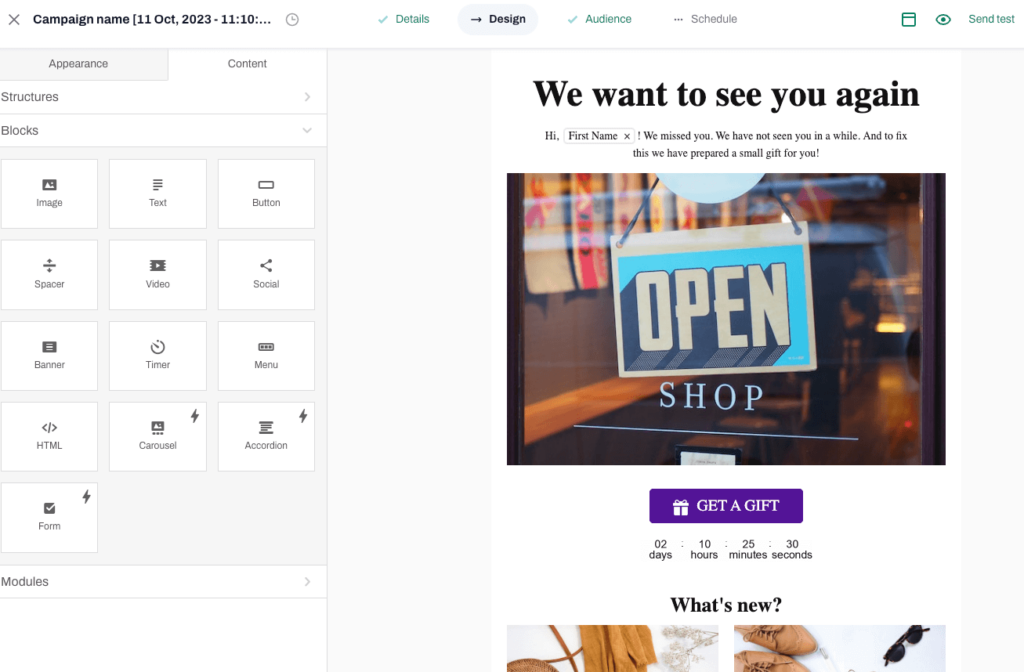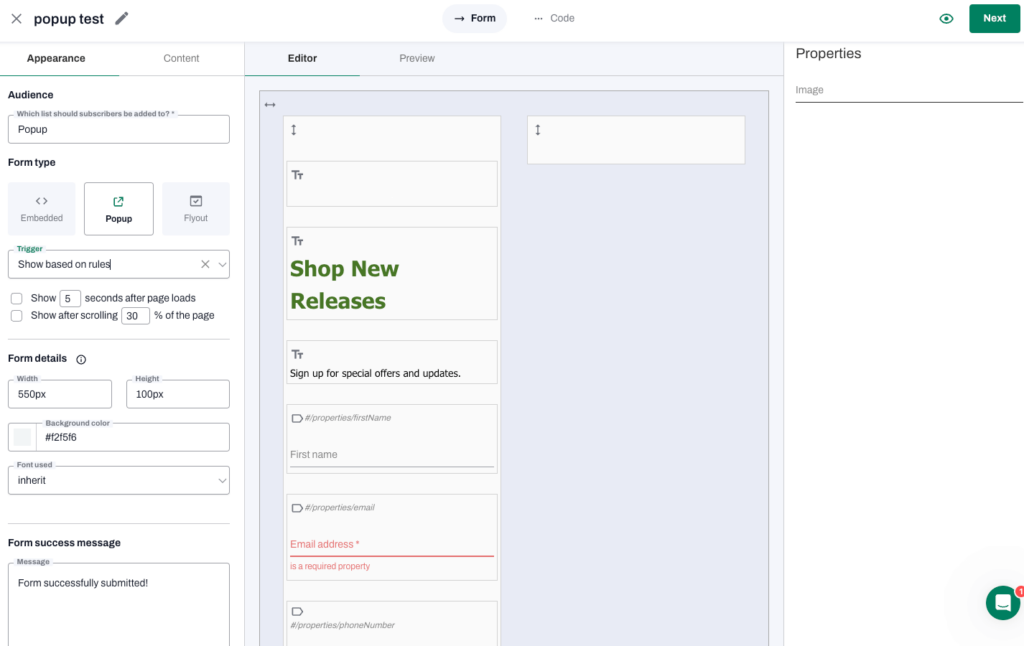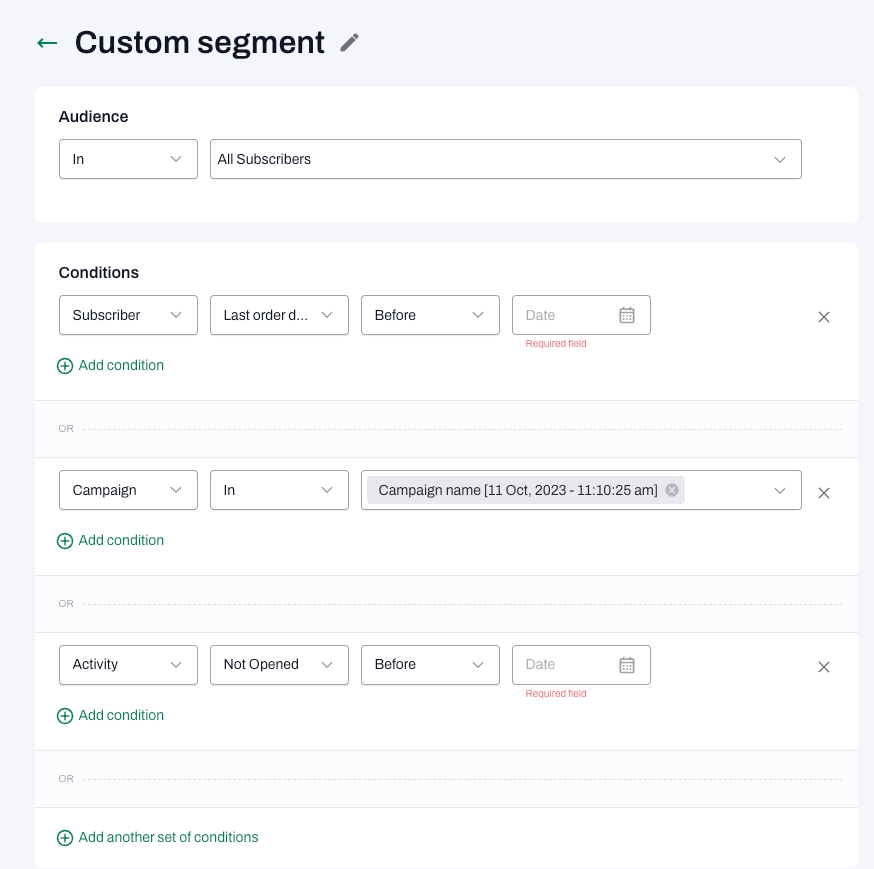The winner – Klaviyo
Life-changing superhero
In this comparison, Klaviyo wins eight out of eleven rounds. One round ends in a tie, and there are two aspects where tinyEmail outperforms Klaviyo. Carry on reading and learn how these two platforms compare with each other.
What Klaviyo features are better than tinyEmail?
- Superior marketing automation features
- Advanced segmentation
- Ecommerce insights and in-depth reporting
- Overall more completed platform
- Basic automation workflows
- Basic segmentation
- Basic reports
- Many things are still awaiting ahead
Even with the emergence of numerous marketing channels, email still rules the roost.
And why’s that so?
One of the primary reasons is the fact that your audience is truly your own on email—you’re not at the mercy of the algorithm changes that social media or search engines bring about regularly.
But here’s the thing—you need a reliable email marketing platform to manage and market your content to your audience through email.
tinyEmail and Klaviyo are among the top-tier email marketing platforms out there along with Omnisend, Mailchimp, and GetResponse.
But which one of the two is better? More importantly, which platform is the right fit for you?
To help you decide, we’ve put together this guide where we review and compare tinyEmail and Klaviyo.
tinyEmail vs Klaviyo: quick overview
tinyEmail has an enviable rating of 4.7/5 on the Shopify App Store from 56 reviews. Customers generally praise the excellent customer service offered by the platform in solving their issues. They also appreciate its UI and UX, which makes it easy for beginners to launch their email campaigns. However, tinyEmail is a less mature platform than Klaviyo and offers less flexibility.
On the other hand, Klaviyo has a lower rating of 4.1/5 on the Shopify App Store but from over 1700 users, meaning it’s more established and widely used. Most users talk about how Klaviyo helps build and manage email campaigns at scale. They also like how the platform helps conduct detailed behavior analysis of your email audience.
On the flip side, the negative reviews speak about the difficulty in getting used to the tool and poor customer service, which impact the user experience.
Which tool among tinyEmail or Klaviyo is the right choice for you, then?
Here’s a glimpse into their features before we dive into them in detail.
In a nutshell, both tools offer the same set of basic features, but tinyEmail lags behind when it comes to advanced features.
But does that mean Klaviyo is the better one among the two?
Not really.
Let’s dig into the features further.
tinyEmail vs Klaviyo: feature by feature
A detailed comparison between Klaviyo and tinyEmail for their features will allow you to understand the nuances and figure out which platform is the best for your business.
So, let’s get started with the tinyEmail vs Klaviyo comparison.
Ease of getting started
tinyEmail is built for beginners and offers a smooth signup process at first. However, we didn’t like a few aspects of the signup process:
- Quite a few questions have to be answered compared to other platforms.
- The platform is too pushy on paid plans when making your decision which one to choose.
- You’re required to provide your credit card details. AND if you stop your signup process, you get an email that registration is also available without credit card information and free plan is also available.
You can also try out the premium plans for seven days, but this trial period is quite short. In a nutshell, tinyEmail’s startup process isn’t the best.
Klaviyo does exceedingly well in comparison. It offers a free tier for which you can sign up. You also get some email and SMS credits to start using the platform. Setting up your account is fairly straightforward, too.

Klaviyo is the winner as signing up is crystal-clear, faster than tinyEmail and doesn’t require any credit card details.
Buiding an email campaign
tinyEmail offers plenty of tools to help you launch your first email campaign. It has an AI-powered subject line and email writer that helps you speed up your email creation. The platform also has numerous email templates that you can customize to suit your needs. This way, you can have a catchy email ready for sending.
The drag-and-drop email editor is user-friendly and works well for beginners to design professional-looking emails. You also get a stock image library to add images to your emails. Inserting a countdown timer into your emails is just as simple.

Much like tinyEmail, Klaviyo has a drag-and-drop email building feature and 100+ templates that help you create eye-catching emails without any technical skills. Likewise, it offers an AI-powered subject line generator.
It’s also possible to optimize your send times as Klaviyo learns the best time to send emails for higher engagement. Additionally, you get ecommerce-oriented elements, like product recommendations, and product content blocks.

That said, both tinyEmail and Klaviyo lack the functionality of adding custom discount coupon codes. Also, tinyEmail doesn’t offer A/B testing features.
Klaviyo is the clear winner here due to the advanced features it offers. However, it’s easy to create email campaigns on both.
Marketing automation
tinyEmail only provides a few basic automation features. You get a few automation workflows if you’re a Shopify user (except for the welcome workflow, which is available for all users).
Additionally, you can’t edit the automation logic; the only action you can take with the suggested flows is to activate them.
On the other hand, Klaviyo is one of those email marketing tools that has many automation features. With its smart automation and deep personalization features, you can build cross-channel workflows combining email, SMS, and mobile push notifications.
It also offers 60+ pre-built workflow templates that you can customize without needing any coding skills. These cover all basic needs like abandoned carts and welcome flows, and more.

With Klaviyo, you get loads of behavioral triggers for sending out emails. It also provides split logic to help you build branching conditions for targeted customer journeys.
And the best part here is that you can use webhooks to send information to any other platform in your tech stack. For instance, you can give loyalty points to your subscribers when they mention you on social media. Such advanced features are absent on tinyEmail.
And what’s missing?
Well, tinyEmail lacks cross-channel flows like combining emails and SMS. Its automation features are also fairly limited. On the contrary, the only limiting aspect of Klaviyo is its high pricing.
Klaviyo is the outright winner when it comes to automation.
Signup forms and landing pages
Well-optimized landing pages and crisp signup forms can play an important role in driving lead generation. That’s why it’s essential that the email platform you choose offers these features.
tinyEmail allows you to create both signup forms and popups. This way, you can easily start collecting email addresses and grow your subscriber base. However, the form builder offered by tinyEmail, in our opinion, isn’t the best. It somehow complicated and not user-friendly.

Klaviyo provides a much better and powerful signup form builder that lets you make mobile-friendly signup forms for your website. The best part here is that these forms can be targeted to your audience for progressive profiling, too. In addition, Klaviyo offers A/B testing for forms.

However, both tinyEmail and Klaviyo lack the ability to build landing pages. Instead, you need to rely on third-party tools to get the job done.
If this feature matters more to your brand, you should consider opting for other email marketing tools like Mailerlite, which offers a landing page builder.
This round is a tie between Klaviyo and tinyEmail.
Segmentation
Segmentation is yet another key aspect you need to take into account when you’re choosing an email marketing tool. It allows you to better target your email communication and boosts your chances of driving conversions.
tinyEmail does well in terms of audience segmentation. You can easily create specific target audience segments using tags and filters like country, phone number, last purchased, high LTV, and company, among others.

tinyEmail segmentation view
Klaviyo takes this one step further. You can add a number of rules to define your target segment for better targeting. Then, you can use these segments for your omnichannel marketing campaigns by including their SMS and email details. This can help you provide a consistent brand experience across channels and drive sales.
The segment builder works with AND-OR operators so you can mix and match numerous rules. Also, you can retarget your segments on social media for better results.
One standout feature of tinyEmail is that you can send emails from team members who are relevant to a particular audience segment for better relevance. You could also show or hide elements in your emails based on the receiver’s device.
On the other hand, Klaviyo’s best feature is that the segments are automatically updated in real-time based on how customers interact with your website and marketing materials. This helps guarantee your segments are always accurate.

Klaviyo segmentation
So, what’s missing?
Klaviyo pretty much gets everything right. The key issue with segmenting on tinyEmail is that most pre-built segments are available only in the Pro plan, and this platform offers less triggers than Klaviyo.
Klaviyo is the outright winner here as it has advanced segmenting and targeting features.
Analytics
tinyEmail offers basic analytics related to your campaigns. You can see:
- Campaign performance trend
- Deliverability rates
- Suppression
- Opens
- Clicks, and more
It also provides URL-based attribution to help you recognize where your revenue is coming from. You can also create reports to showcase your campaign performance.
When it comes to analytics, Klaviyo has a reporting tool and dashboard that are built for ecommerce marketing. Using it, you can track essential metrics like:
- Site visits
- Revenue by channel
- Total orders
- Open rates
- Click-through rates, and more
The best part about Klaviyo is that the analytics integrates data from multiple channels to give you an overview at a single spot.
It’s also possible to create and schedule reports using pre-built templates. You can also share them with your teammates and other stakeholders.
Additionally, you can:
- Check campaign performance by segment
- Compare campaign performance with email benchmark
- Track campaign trends
But where do these platforms fail?
The analytics offered by tinyEmail miss out on geolocation reports, orders, revenue, and more—things important for ecommerce. Klaviyo’s only drawback is that the numerous analytics features can be intimidating for beginners.
While both platforms provide analytics and reporting, Klaviyo has an edge due to in-depth insights.
Customer support
Customer service plays an important role in defining the overall user experience of a platform. Reliable customer support guarantees that you always have someone to help when you hit a roadblock.
tinyEmail offers customer support in the form of an extensive knowledge base through which you can learn how to use the platform.
You can also get in touch with their team through the live chat and email 24/7. tinyEmail’s customers praise their customer support team for prompt and effective replies.
Likewise, Klaviyo provides customer support in the form of helpful resources in its knowledge base. You can also submit tickets and connect with their team through chat and email. That said, free plan email support is only available for the first 60 days.
Even on the paid plans, you get email and chat support 24/5. That said, customers aren’t very satisfied with the level of support offered by Klaviyo due to slow responses.
tinyEmail is the clear winner when it comes to customer support as customers are generally happy with their service.
Integrations
Your email marketing tool’s features can get you far. But integrations are the way to go if you want to make the most of your platform. They help you connect all tools in your tech stack so you don’t need to switch between platforms for basic activities.
tinyEmail integrates with all major ecommerce platforms, including WooCommerce, Magento, Volusion, Recurly, and Shopify. It also connects with 300+ tools through third-party integrations.
On the other hand, Klaviyo offers 300+ pre-built integrations to platforms like PrestaShop, Shopify, BigCommerce, WooCommerce, Recharge, Gorgias, and more. You also get open APIs for custom integrations.
Klaviyo is a better developed platform with more integration options.
Compatibility with other channels
If you want to leverage multi or omnichannel marketing, your email marketing platform must be compatible with other channels.
tinyEmail only has email marketing features and isn’t compatible with any other channels. That said, they are building compatibility features for SMS, WhatsApp, Messenger, push notifications, and chat. However, this is still a work in progress.
Klaviyo already offers compatibility with SMS and mobile push notifications. This allows you to run omnichannel marketing campaigns across the three channels.
Klaviyo is the winner for its omnichannel compatibility.
Generative AI tools
Generative AI can help you write catchy headlines and create email drafts quickly.
tinyEmail offers tinyAlbert that helps you write compelling email subject lines. You can even use it to generate copy for your marketing emails. It’s worth noting that tinyAlbert is powered by OpenAI and is available only for Shopify users.
Likewise, Klaviyo provides generative AI features to take care of writing for you. You can easily generate SMS copies, email subject lines, responses for SMS conversations, and email copies using it. The instant generation helps speed up your omnichannel campaigns.
Both Klaviyo and tinyEmail excel at generative AI features.
Price comparison
Both tinyEmail and Klaviyo have free plans. Let’s see how they stack up in terms of features.
- 250 subscribers
- 500 monthly emails
- 150 SMS credits
- SMS carrier fees included
- Email support for first 60 days
- All features available
- 500 subscribers
- 15,000 email sends per month
- Forms and popups
- Automation emails
- 15 AI-generated subject lines per day
- Limited sender identities
- 24/7 email and chat support
Clearly, the free plan offered by tinyEmail is more extensive in terms of both email and subscriber numbers. However, if SMS is a dealbreaker for you, Klaviyo is the better option.
In this section, it’s important to mention that tinyEmail has launched its Shopify Pro plan which offers paid features and is totally free for Shopify users.
Paid plans comparison
tinyEmail has three paid plans that give unlimited subscribers, premium templates, and pre-built and custom segments. tinyEmail pricing is based on email monthly sends. The higher tier plans unlocks bigger amounts of email credits and premium features. On the other hand, Klaviyo has two paid plans that have the same features with the main difference being the inclusion of SMS. Klaviyo pricing is based on the number of subscribers, not email sends.
The Standard plan on tinyEmail has a limit on the number of subject lines you can generate per day. It also puts a cap on segments and senders.
The Pro plan offers all of these features plus a dedicated IP, custom domain, and priority support. You also have an Enterprise plan where you can customize all the features.
Similarly, Klaviyo’s Email plan gives you the ability to send emails to your audience and provides 150 SMS credits per month.
But if SMS matters more to you, the Email and SMS plan is a better option as it gives you more SMS credits (starting from 1250 SMS credits per month). The best part here is that you can choose the number of emails and SMS separately to get the right pricing for your needs.
The key difference between the pricing plans for Klaviyo and tinyEmail is that Klaviyo provides SMS and push notifications as a rider. The email-sending capacity remains the same across plans.
On the other hand, all the paid plans of tinyEmail have something different to offer in terms of features.
Summary - which one wins?
Before we reveal the winner, let’s see how the tools stack up at a glance.
4.6
3.5
- 500 subscribers – $20
- 1000 subscribers – $30
- 2500 subscribers – $60
- 10,000 subscribers – $80
- 50,000 subscribers – $650
- 100 000 subscribers – $790
- Up to 15,000 emails – $15
- Up to 25,000 emails – $25
- Up to 50,000 emails – $50
- Up to 100,000 emails – $100
- Up to 250 contacts
- 500 monthly email sends
- The vast majority of platform features
- Mobile push notifications (beta)
- Built-in CDP
- 150 free monthly SMS/MMS credits
- Includes applicable SMS carrier fees
- Email support for first 60 days
- Up to 500 subscribers
- Up to 15,000 emails
- Forms and popups,
- Automation emails
- AI subject line assistant
- Shopify Pro plan for Shopify users
- Limited sender identities
- Pre-built signup forms, and automation workflows that can work out of the box
- Beautiful email templates
- Very good analytics and reports
- Outstanding segmentation
- Easy to signup and use
- Good email builder
- An extended list of email templates
- It doesn’t have unique coupon codes
- No marketing gamification options
- This tool gets expensive very quickly
- For beginners, the learning curve might be too steep, it’s meant for advanced users
- Basic automation and reporting
- Pretty basic segmentation
- Form builder should be improved
- Ecommerce
- Advanced users
- Small ecommerce businesses and email marketing beginners
- Bloggers
- Non-profit organizations
- Email marketing beginners
- Marketers on a budget
- Non-profit organizations
- Established ecommerce businesses
Both tinyEmail and Klaviyo are handy email marketing tools that work well for ecommerce businesses. There are loads of common features between the two platforms like generative AI, signup form creation, and the ease of building an email campaign.
However, Klaviyo is better suited for more advanced users as it offers omnichannel marketing capabilities through SMS and mobile push notifications. Also, the multitude of features it provides justifies its higher price point in comparison to tinyEmail.
On the contrary, better customer support and lower pricing make tinyEmail a more reliable option for those with limited budgets and technical know-how.
So, carefully consider your requirements and match them up with the features offered by both before making your choice.
Also, check out our tool comparison articles with Mailchimp vs Klaviyo, Mailchimp vs tinyEmail, Omnisend vs Klaviyo, and tinyEmail vs Omnisend. These platforms have similar interfaces and can help you solve your dilemma.
Read full reviews
Related picks for you
Our team strives to be accurate and unbiased in reviewing email tools. However, we recognize that mistakes can happen, and it’s essential for us to stay up to date. If you come across any errors or things that need to be reviewed again, please let us know.





Leave a Reply